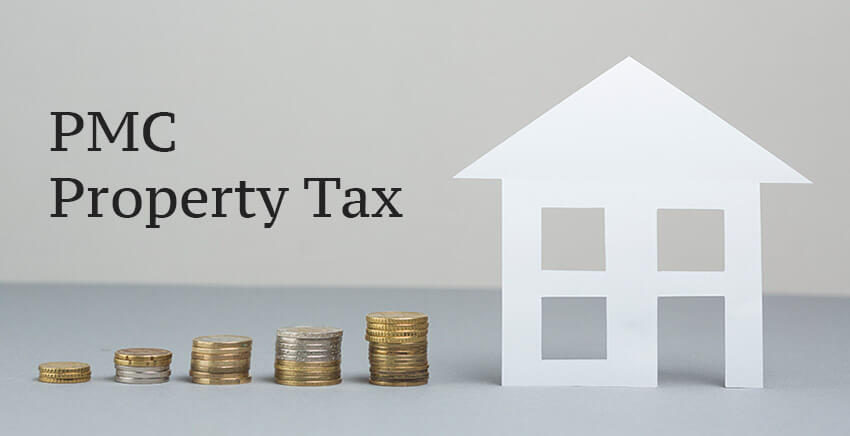Buying a new home is an experience full of emotions and calculations.
You set a budget, search for the right home loan, and plan for down payment and EMIs. This is the classic financial planning of a homebuyer.
However, some homebuyers go a step further and calculate the yearly property tax they would incur on their new home as well. Some do it just to stay informed of the tax amount, some do it to calculate savings on income tax, while some do it to compare the return on their investment versus tax.
So whatever your reason may be, we thought of offering basic information on Pune Municipal Corporation’s (PMC) property tax, to keep you well informed while buying a property.
Introduction To PMC Property Tax
In September 2016, the PMC made reforms in the property tax assessment process. This initiative was started with the objective of identifying unauthorized and illegal properties and increasing revenues for the city’s development. The PMC began verifying the size of properties through Geographic Information System (GIS), verifying their documents, assessing values of properties based on their location, and levying tax.
Who Has to Pay Property Tax in Pune?
The Pune Municipal Corporation (PMC) levies property tax on almost every type of property that falls within its jurisdiction. Here are the main categories of taxpayers:
- Residential Properties: Owners of flats, apartments, bungalows, and row houses.
- Commercial Properties: Shops, offices, showrooms, warehouses, and other business establishments.
- Industrial Properties: Factories, workshops, and other industrial units.
- Institutional Properties: Schools, colleges, hospitals, and trusts (though some may receive exemptions).
- Vacant Land: Empty plots within PMC limits are also subject to tax based on usage and market value.
This classification ensures that all property types contribute fairly to city maintenance and development.
Why Paying Your PMC Property Tax is Important?
Paying property tax on time is more than just compliance; it has multiple benefits:
- Fulfills Civic Duty: Your tax directly funds city services such as sanitation, street lighting, road upkeep, and public health initiatives.
- Avoids Penalties: Late payments attract a 2% monthly penalty on the outstanding amount, which can quickly increase your liability.
- Eligibility for Rebates: Timely or early payments often qualify for rebates and concessions.
- Smooth Property Transactions: Having a clear property tax record simplifies future property sales, transfers, or mortgage approvals.
PMC Property Tax Rates 2025
PMC determines tax based on the property’s type, usage, and zone. The applicable rates per square foot are:
| Property Type | Rate (per sq. ft.) |
| Residential (Self-Occupied) | ₹2 – ₹6 depending on zone |
| Residential (Rented) | ₹4 – ₹12 depending on zone |
| Commercial | ₹10 – ₹25 based on property type and zone |
| Industrial | ₹8 – ₹20 |
| Vacant Land | Calculated on market value & usage |
These rates form the base, and factors like age, usage, and location further influence the final payable amount.
Calculation Of PMC Property Tax
Property tax depends on four major factors- type of property (Residential, Non-Residential, Mixed, Miscellaneous, Industrial or Open Land), carpet area of the property, ready reckoner rates of a property (government valuation), and type of construction (RCC, Simple or Shed).
A simple formula is used by PMC to calculate property tax:
Property Tax = Tax Rate x Capital Value
(Capital Value = Base Value x Built-up Area x Usage x Building Type x Age Factor x Floor Factor)
While some developers can provide you the final tax amount of a particular property, you can visit PMC’s website and calculate tax to verify it yourself.
Rebates and Exemptions
PMC offers certain concessions to reduce the tax burden for specific categories:
- Senior Citizens: Up to 10% rebate on self-occupied residential property.
- Persons with Disabilities (PwDs): Concession of up to 15% on applicable properties.
- Charitable Trusts & Religious Institutions: Eligible for partial or full exemptions depending on usage.
- Green Initiatives: Properties with solar panels, rainwater harvesting, or composting facilities may receive eco-friendly rebates.
- Timely Payers: Early payment before April 30th can fetch up to 10% rebate.
Checking eligibility for these rebates on the PMC portal is advisable before making payments.
Documents Required For Assessment Of Property Tax
There are two types of documents that are needed-
- Documents establishing ownership of property (any or multiple of the below ones depending on your case)
- Sale deed
- Index II
- 7-12 extract
- City survey extract
- Documents issued by Building Permission Department (any or multiple of the below ones depending on your case)
- Occupancy certificate
- Building permission certificate
- Building completion certificate
- Approved plan
How to Check if Your Property Falls Under Pune Jurisdiction
Before calculating or paying tax, ensure your property lies under PMC limits. Here’s how:
- Visit the official PMC property tax portal.
- Enter details such as property address, Peth ID, or section ID.
- Use the jurisdiction map tool available on the portal to verify if your property is listed within PMC boundaries.
- If your property does not appear, check with the local ward office or property tax department.
This step avoids errors during payment and ensures you are taxed under the correct civic body.
Procedure to Pay Property Tax Online in Pune
Paying property tax online in Pune is a straightforward process designed for ease and convenience. First, visit the official Pune Municipal Corporation (PMC) tax payment website at propertytax.punecorporation.org. Once there, you’ll be prompted to choose a payment option, such as RTGS/NEFT or UPI. After selecting your preferred payment method then fill in the necessary property details, including your PETH ID, section ID, property type, and account number. This will land you on the payment page relevant to your chosen method. Complete the transaction as guided by the payment gateway. After successful payment, you will receive a confirmation message, and you can download or print the receipt for your records.
Steps –
- Visit propertytax.punecorporation.org
- Choose between RTGS/NEFT or UPI payment.
- Enter property details (PETH ID, section ID, property type, account number).
- Complete the transaction and receive a confirmation.
- Download or print the receipt.
How to Get Receipt of PMC Property Tax Payment
Once you complete your property tax payment, obtaining the receipt is essential for records:
- Online: Log in to the PMC portal, go to “Property Tax Receipts,” enter your property details, and download/print your receipt.
- Offline: Pay at a ward office, citizen facilitation center, or authorized bank branch, and collect the printed receipt immediately.
- Mobile App: Use PMC’s official app to make payment and download a digital receipt on the spot.
Keeping receipts is important for property transactions, income tax records, or any future disputes.
How to Submit the Property Details for Tax Calculation and Payment?
To ensure accurate property tax calculation and payment, it’s essential to submit your property details to the PCM. This process begins with filing a request with the PMC, along with necessary documents such as the building plan, ownership documents, and the occupancy certificate. These documents provide essential information for tax assessment. After submission, an authorized official will verify the details, and once approved, your property information will be updated in the PMC’s system. It is important to check that these updates are reflected online to avoid any difference in future tax calculations and payments.
Steps –
- Request Filing: Submit a request to the PMC to update the property details.
- Document Submission: Provide documents like the building plan, ownership documents, and occupancy certificate.
- Verification: PMC officials verify the details.
- Update: Property details are updated in the PMC system.
- Online Reflection: Ensure the updates are reflected online for accurate tax assessment.
Timelines For Paying Property Tax
The PMC has mandated two timelines for paying property tax in a year-
- April 1st to September 30th, with a due date of 31st May
- October 1st to March 31st, with a due date of 31st December
You will be charged a penalty of 2% per month if you make a payment beyond the due date.
Property Tax Bill
There are three ways you can get your property tax bill-
- By post
- At the Ward Office for your property’s location
- Propertytax.punecorporation.org
Tax Payment
You can pay property tax in four ways-
- Cash/cheque/D.D. at a Ward Office
- Cash/cheque/D.D. at PMC’s citizens’ facilitation centre
- Online payment at propertytax.punecorporation.org
- Cosmos, HDFC, ICICI and Bank of Maharashtra branches
Conclusion
This is just the basic information related to property tax. If you would like to explore it in detail, you can visit propertytax.punecorporation.org/faq to read about the frequently asked questions and answers.
Also, if you are buying a property at Amanora Park Town, feel free to visit and ask us any queries related to property tax. We are committed to making your homebuying experience hassle-free.





